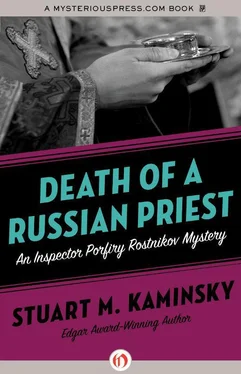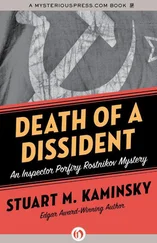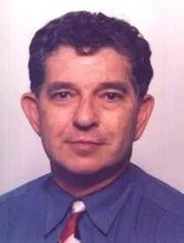Stuart Kaminsky - Death Of A Russian Priest
Здесь есть возможность читать онлайн «Stuart Kaminsky - Death Of A Russian Priest» весь текст электронной книги совершенно бесплатно (целиком полную версию без сокращений). В некоторых случаях можно слушать аудио, скачать через торрент в формате fb2 и присутствует краткое содержание. Год выпуска: 2012, Жанр: Полицейский детектив, на английском языке. Описание произведения, (предисловие) а так же отзывы посетителей доступны на портале библиотеки ЛибКат.
- Название:Death Of A Russian Priest
- Автор:
- Жанр:
- Год:2012
- ISBN:нет данных
- Рейтинг книги:3 / 5. Голосов: 1
-
Избранное:Добавить в избранное
- Отзывы:
-
Ваша оценка:
- 60
- 1
- 2
- 3
- 4
- 5
Death Of A Russian Priest: краткое содержание, описание и аннотация
Предлагаем к чтению аннотацию, описание, краткое содержание или предисловие (зависит от того, что написал сам автор книги «Death Of A Russian Priest»). Если вы не нашли необходимую информацию о книге — напишите в комментариях, мы постараемся отыскать её.
Death Of A Russian Priest — читать онлайн бесплатно полную книгу (весь текст) целиком
Ниже представлен текст книги, разбитый по страницам. Система сохранения места последней прочитанной страницы, позволяет с удобством читать онлайн бесплатно книгу «Death Of A Russian Priest», без необходимости каждый раз заново искать на чём Вы остановились. Поставьте закладку, и сможете в любой момент перейти на страницу, на которой закончили чтение.
Интервал:
Закладка:
“Yes,” Aleksandr said, and he was surprised to discover that he meant it.
“One other question. Did your grandfather ever talk about someone named Oleg?”
“You mean Oleg the baker who lives-”
“A special Oleg,” said Rostnikov.
“No,” said the boy. “I’m late.”
“Do you ever think of what you want to be, Aleksandr, when you grow up?”
“No.”
“No? My son was a soldier and now he writes plays about soldiers. He wants to be a policeman like me.”
“I want …” the boy began, “I want to be a pilot.”
“Perhaps when you are old enough to be a pilot, there will be fuel for airplanes,” said Rostnikov. “I must go to my train. You must go to your grandfather’s funeral. We’ll talk again, Aleksandr. I’ll tell you what the McDonald’s looks like. Maybe I can bring a picture of it for you.”
“You won’t tell anyone I want to be a pilot,” the boy said.
“Policemen and priests must keep secrets,” said Rostnikov, buttoning his coat. “Do you have another secret you would like me to keep?”
“There is another Oleg.”
“Another Oleg,” repeated Rostnikov.
“I heard my grandfather talk about Oleg to Sister Nina,” said the boy.
“And you are sure it was not one of the Olegs of Arkush?”
“I am sure. They … it was like he was talking about someone … I don’t know, someone dead.”
“Thank you Aleksandr,” said the policeman.
Aleksandr nodded and dashed through the door into the kitchen. As he hurried past the old woman he was suddenly afraid again, afraid that the policeman would discover that it was not from the mouth of his father or Sister Nina that he had learned of Oleg.
“Dust thou art and to dust thou shalt return, until the day of the Resurrection.”
The words were sung by a choir of six in the crowded church of Arkush, where the funeral of Father Merhum was under way.
The decision had been made for Emil Karpo to attend the funeral alone. “Watch, listen, report,” Rostnikov had said. “I’ll be going back to Moscow after I talk to the boy.”
“The boy?”
“His eyes, Emil Karpo. Look at the boy’s eyes. He holds a secret and it troubles him. I’ll return in the morning.”
Karpo understood why Rostnikov could not attend the funeral. The congregation would stand during the entire two-hour service, and Rostnikov’s leg could not bear weight that long. As an outsider, he could have asked for, and would have been given, a chair. But the congregation, the people with whom he and Karpo would have to deal, would see this Moscow policeman sitting apart from them, an outsider.
It would be better for Karpo to serve as Rostnikov’s eyes and ears.
“Look for those who weep too much,” he said to Karpo, who had moved to the door of the meeting hall. “And look for those who do not weep, or pretend to weep.”
Karpo had nodded and left the hall.
Now he stood in the church among the weeping and the silent. Those in the crowd did their best to ignore the specter, which all but those closest could do. Among the mourners were several children. One of them, a girl of about four with corn-gold hair, kept turning from the coffin to look at the policeman.
The coffin contained Father Merhum in full white vestments. A cotton burial shroud was laid over the body as the choir sang of resurrection. Karpo’s eyes moved to the third level of icons on the iconostasis behind the priest. Each icon was a painting that depicted an event in the life of Christ. Karpo found the icon depicting the Resurrection.
Peotor and Aleksandr Merhum stood to the right of me coffin along with a plump woman with a pretty round face and an ancient nun whose eyes never left the coffin. In the crowd, close to the front of the congregation, stood two more of the men who had met Karpo and Rostnikov at the train station. Vadim Petrov, the burly farmer, stood on the right of me mayor, who tried not to fidget. A woman, who seemed to be the mayor’s twin and was probably his wife, kept nudging him to stand erect.
The thin, bearded priest who conducted the ritual appeared to be no more than forty. He incensed the body, sang prayers, and placed a paper and candle in the dead hands. Then, amid a great deal of weeping, Father Merhum’s family, even the boy, and the ancient nun kissed the hands and forehead of the dead man.
Peotor Merhum, however, did not weep, nor did he smile or pretend. His face was solemn, but he seemed to be thinking of a chore that had to be done somewhere far away.
When the family was finished, the congregants and visitors lined up to kiss the corpse. The little girl with corn-gold hair was held up by a woman who could have been her mother or grandmother. The girl looked at the dead priest and then at Emil Karpo as if there must be some connection between these two frightening pale figures.
When the line of mourners ended, two men stepped forward. The candle was removed from the hands of the corpse and the two men laid the coffin lid over the body and hammered in the nails. The echo of their hammers brought a new round of wailing.
When the priest who had conducted the ceremony disappeared, the old nun moved through the crowd, touching hands, kissing, and consoling. When she reached Emil Karpo, who had not moved during the entire ceremony, she said, “Policeman?” Though she was old, her skin was barely wrinkled. Her back was straight and her voice steady. Her black habit made her face look round.
“Yes,” he said.
“I am Sister Nina. Come with me.”
She turned and walked to the entrance of the church. Karpo caught up to her and walked at her side. Behind them the mourners continued to hover around the coffin.
“I watched you,” she said.
Karpo had not seen her lift her eyes from the coffin, but he did not doubt her, especially when she added, “Something touched you.”
He did not answer as they moved down the steps, through the people gathered outside the church, waiting to see the coffin. Something had happened to Karpo during the funeral. Perhaps it was the heat of the small church, but in the midst of a prayer sung by the congregation he had felt an impulse either to weep or to join the song. It had passed quickly, but it had been there and it had been like nothing he could remember.
No, wait. He had felt like this before. When?
“You are trying to remember something,” the nun said as they reached the street and headed toward the woods.
Karpo said nothing as they passed small houses and a few shops that were closed in mourning.
“You wonder how I know,” she said. “You are not used to people understanding you. It makes you uncomfortable.”
“Uncomfortable? No. Curious perhaps.”
“Come this way.” She stepped onto a paved pathway between two houses spaced further apart than the others they had passed. “The house is this way, just beyond those trees.”
As they moved along the path an animal scuttled through the bushes.
“I have spent a lifetime watching people during services. Almost all nuns have an intuition. You are a particularly difficult person to feel.”
Karpo followed the woman silently. They walked for about ten minutes through the woods until they came to an old house.
“Here,” she said.
He followed her through the gate.
“It was there he died in my arms,” she said, pointing to the path just inside the gate.
Karpo looked at the path and saw nothing. He followed her through the unlocked door into the house.
“I’ll make us tea. Wait here, please,” she said, and moved into the next room.
The walls of the room in which he stood were covered with icons. One depicted a man in a striped prison uniform. The man was gaunt and pale, more pale than Karpo, but similar enough to be his brother.
Читать дальшеИнтервал:
Закладка:
Похожие книги на «Death Of A Russian Priest»
Представляем Вашему вниманию похожие книги на «Death Of A Russian Priest» списком для выбора. Мы отобрали схожую по названию и смыслу литературу в надежде предоставить читателям больше вариантов отыскать новые, интересные, ещё непрочитанные произведения.
Обсуждение, отзывы о книге «Death Of A Russian Priest» и просто собственные мнения читателей. Оставьте ваши комментарии, напишите, что Вы думаете о произведении, его смысле или главных героях. Укажите что конкретно понравилось, а что нет, и почему Вы так считаете.












